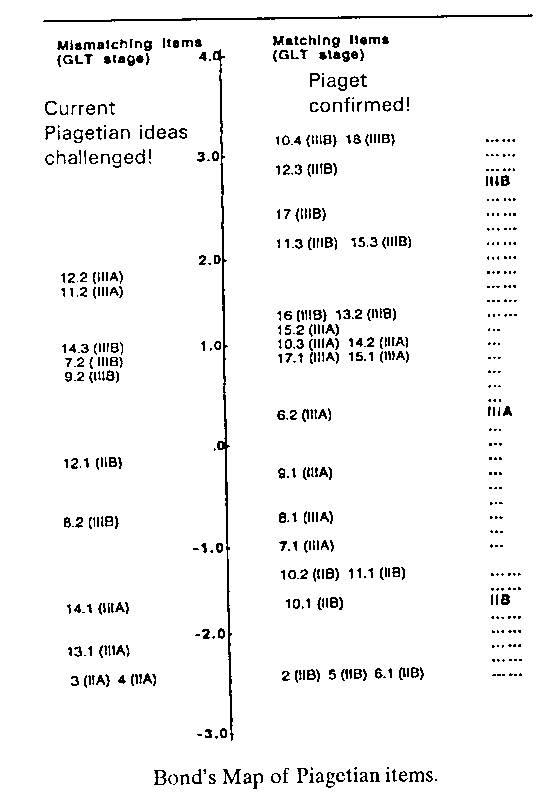Piaget and Measurement
 Can a Piaget
theory of discontinuities in development be investigated using Rasch's
theory of a continuous measurement scale? Indeed it can! And in a
series of three papers in Archives de Psychologie (1995), Trevor
Bond demonstrates the value of a Rasch approach.
Can a Piaget
theory of discontinuities in development be investigated using Rasch's
theory of a continuous measurement scale? Indeed it can! And in a
series of three papers in Archives de Psychologie (1995), Trevor
Bond demonstrates the value of a Rasch approach.
If Piaget's stages of development, advancing from concrete to abstract
thinking,could only be observed as a series of distinct leaps, then they
would produce Guttman response patterns in response data. We would know
there were leaps in mental functioning, but we would not know how big
they were. Unless they can be placed on a continuous measurement scale,
it is impossible to discover how big are the leaps, which leaps are
biggest, and how large they are compared with development between the
leaps.
In fact, Bond's study shows that the responses do not form a perfect
Guttman pattern, but they do show strong ordering. "The overwhelming
degree of concurrence of stage allocations derived on the one hand from
Piaget's idiosyncratic logical analyses and on the other by rigorous
statistical analysis provides an unprecedented validation of this aspect
of the Piagetian oeuvre." (Bond p.242)
The plot shows, on the right side, the Piagetian items validated by
the measurement system -- observe the advance up from IIB to IIIA to IIIB
(indicated to the extreme right). On the left side are the items which
challenge Piaget's theory. Observe that the top IIIA is well into the
IIIB's, suggesting there is no discontinuity. These items require either
refinements to Piagetian theory or revisions to the item classification
rules. Simply put, good measurement provokes better theory!
Trevor G. Bond is at the School of Education, James Cook
University of North Queensland, Townsville QLD 4811, Australia.
e-mail: trevor.bond@jcu.edu.au
Bond T.G. (1996) Piaget and Measurement I: The twain really do meet.
Archives de Psychologie 63, 71-87.
Bond T.G. (1996) Piaget and Measurement II: Empirical validation of
the Piagetian model. Archives de Psychologie 63, 155-185.
Bond T.G. (1996) Piaget and Measurement III: Reassessing the
Méthode Clinique. Archives de Psychologie 63,
231-255.
Go to Top of Page
Bond T.G. (1996) Piaget and Measurement. Rasch Measurement
Transactions 10:2
Piaget and Measurement. Bond T.G. … Rasch Measurement Transactions, 1996, 10:2 p. 491
 Can a Piaget
theory of discontinuities in development be investigated using Rasch's
theory of a continuous measurement scale? Indeed it can! And in a
series of three papers in Archives de Psychologie (1995), Trevor
Bond demonstrates the value of a Rasch approach.
Can a Piaget
theory of discontinuities in development be investigated using Rasch's
theory of a continuous measurement scale? Indeed it can! And in a
series of three papers in Archives de Psychologie (1995), Trevor
Bond demonstrates the value of a Rasch approach.